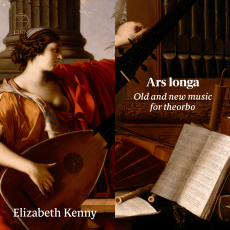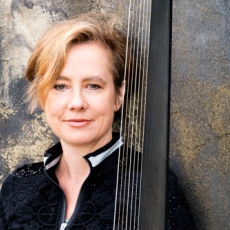Elizabeth Kenny - Ars longa (Live) - Cleveland Classical
During the years of covering the Cleveland International Classical Guitar Festival, I have had the pleasure of hearing recitals performed on Baroque, Classical, Romantic, and modern instruments as well as the lute. But somehow, a theorbo recital had not crossed my path. That was until Saturday, June 8 in CIM’s Mixon Hall when Elizabeth Kenny (England) presented “Theorbo Fantasy: old and new music for the long-necked lute.” I was captivated from beginning to end.
The musically diverse and brilliantly performed program included the world premiere of Nico Muhly’s Berceuse with seven variations. In a preview for this publication, Kenny said that she has been a fan of Muhly’s music for a long time, and that she knew he had written for the lute. “I sent him a fan mail and said, ‘Please, would you write something for the theorbo?’ and he very kindly accepted.”
In his composer notes Muhly writes:
[The piece] is constructed around a cycle of twenty-four chords, spaced with a maximum distance between the lowest and highest notes. Each variation explores various paths through this cycle, but always keeping the idea of a cradle-song, a berceuse, in the background. Some of the variations treat this music subtly and calmly, and other times, exploding the chords into fast-moving notes found at the extremes of the instruments. The piece ends with the chords dispersed, inverted, and made gentle again.
Never has a composer more accurately described their work, but more importantly — the result is stunning. Beginning with the sounds of an original, deconstructed cradle song, Berceuse is defined by lilting rhythms and melodic twists and turns that are simultaneously dark yet playful. The sometimes simple, sometimes complicated writing creates a vivid storyline of a mother rocking her baby as she imagines all the good and all the struggles the child will encounter in life.
In the hands of Kenny these images became as real as if a theatrical production were taking place onstage beside her.
The afternoon also featured contemporary pieces by James MacMillan and Benjamin Oliver. MacMillan’s Motet I (Since It Was the Day of Preparation) comes from a larger work written for five voices and five instruments that tells the story of the Crucifixion and Resurrection. Each instrument is given an extended solo that can also be performed as a free-standing piece. Kenny provided the proper amount of angst for this sad, lonely meditation.
In contrast, Benjamin Oliver’s spirited Extending from the Inside is built on a bass line that supports intricate rhythmic lines, and some wild strumming that verges on shredding. Kenny was having great fun as she dug into the music with gusto.
Early music was placed on the opposite side of this programming teeter-totter. Alessandro Piccinini’s Toccata Cromatica, which opened the program, featured the theorbo’s ability to produce punctuated low notes. And Kenny’s playing of both his Partite variate sopra la Folia and Ciaconna was simply magical.
Kenny’s abundant technique and keen musical sensibilities were front and center during Hieronymus Kapsberger’s Toccata, Passacaglia, Capona, Canario, and Colascione. Defined by sudden shifts of mood and virtuosic melodic lines, the work ends with a hit of Turkish exoticism.
Music from the French Baroque — Robert de Visée’s Suite in c, Prelude, Les Sylvains de M’Couperin, and Chaconne — rounded out the program. The theorbist relished every moment of these charming pieces.
Throughout the afternoon, Kenny supplied the perfect amount of informative commentary as she explained the evolution of the theorbo and its complicated tuning system.

